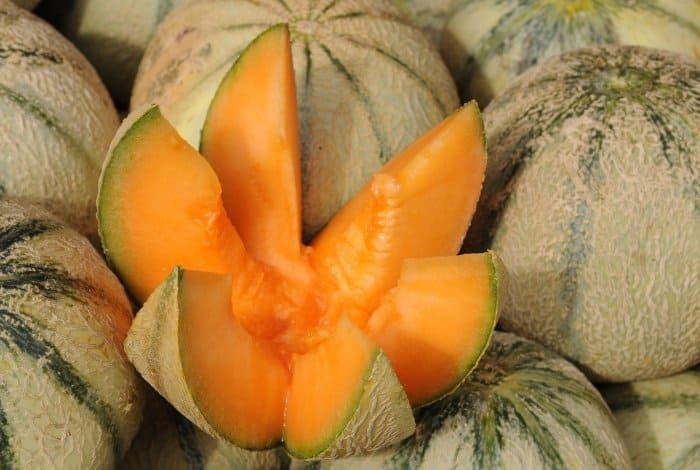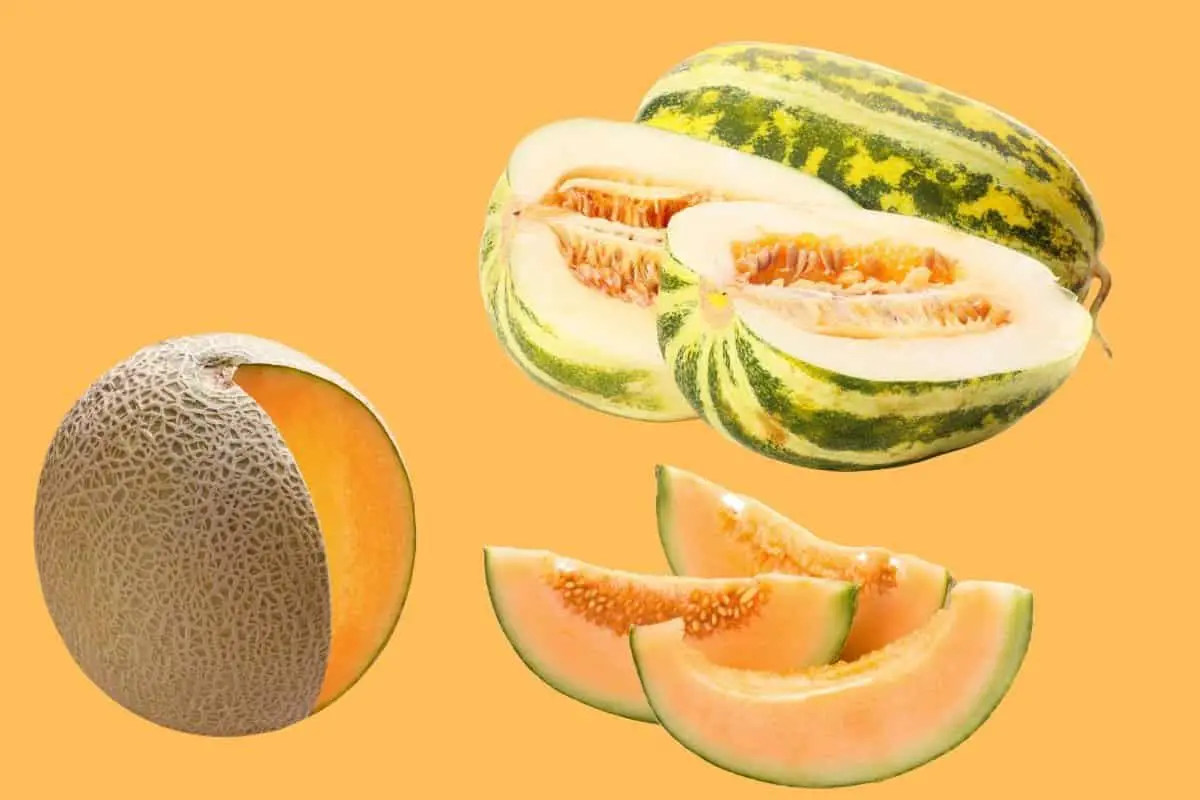Last Updated on January 20, 2022 by
What is the difference between cantaloupe and muskmelon? Learn the difference between these two summer fruits so you know their identity.
Cantaloupes and muskmelons are popular fruits loved for summer desserts and salads. They both have a refreshing aroma and flavor and you can use them interchangeably. Though they look the same, they are different in some ways.
Muskmelon Vs. Cantaloupe
Muskmelon (Cucumis melo) is a species of melon belonging to the gourd (Cucurbitaceae) family. It is closely related to other plants like pumpkin, squash, watermelon, and zucchini.
It is a sweet, flavorful fruit loved for its vibrant flesh and culinary versatility. Besides its flavor, it provides you with important nutrients that have many health benefits.
Muskmelon has tan, ribbed skin and sweet orange flesh with a musky flavor and aroma. It does well in moderate subtropical, warm climates and prefers rich well-drained fertile soils.

These fruits have high water content and are full of health benefits. They make a perfect snack for a sweet tooth. They are rich in Vitamin A and beta carotene is known to improve eyesight. They’re also a good source of Vitamin C that helps you fight off the dreaded summer cold. Muskmelon is rich in anti-inflammatory nutrients that act as powerful antioxidants protecting your body from all kind s of infections.
Muskmelon is delicious and commonly enjoyed by many. You can cut into cubes and enjoy them alone or add them to a salad. Or churn them into a fresh sorbet for a healthy way to satisfy your sweet tooth. You may add it to smoothies for a burst of extra flavor and nutrition. You can also dry and roast the seeds and eat them as a snack or sprinkle them over soups and salads.
Read more about When to Pick Cantaloupes from The Vine
Cantaloupe Vs. Muskmelon
Cantaloupe (Cucumis melo cantalupensis) refers to two varieties of muskmelon – the North American cantaloupe (C. melo var. reticulatus) and the European Cantaloupe (C. melo var. cantalupensis).
The European Cantaloupe is the real cantaloupe and it’s not grown commercially in the United States. Its rind has a harder texture, a distinct netting, and a subtle less distinct flavor. The European cantaloupe has light green skin and sweeter flesh against the appearance of the North American cantaloupe. Though they are both cantaloupes they have differences in skin type and flavor.
Muskmelon, on the other hand, grows commercially and is more available than the cantaloupe. Cantaloupe is harder to grow and has a more subtly sweet flavor than its counterpart.
Both of these cantaloupes have the same nutritional value and health benefits as muskmelon.
Cantaloupe has powerful anti-inflammatory properties that help decrease oxidative damage to cells.
Note: All cantaloupes are muskmelons but not all muskmelons are cantaloupes. Other varieties of muskmelon besides cantaloupes include Persian melon, Honeydew, and Santa Claus melon.
Also known as rockmelon in Australia, the cantaloupe originated from Italian cantaloupe formerly from Rome. The cantaloupes have a net-like light green rind and sweet orange flesh.
Find out The Best Way to Cut a Cantaloupe
Differences Between Cantaloupe And Muskmelon
- Family. These two fruits belong to the same Cucurbitaceae family. However, cantaloupe is a member of the cantalupensis and the muskmelon from the reticulatus group
- Appearance. When differentiating these two fruits, look at their appearance. The muskmelon has a tan and ribbed skin with sweet orange flesh and a must-like taste and aroma. The cantaloupe has a net-like, light green skin, a central seed activity, and a sweet salmon-hued flesh.
Milkary 4 PCS Stainless Steel Fruit Corer Cutter Kit
- Flavor. Muskmelon has a sweet musky taste and high sugar content that lingers for a long time. Cantaloupe when fully ripe offers a juicy smooth and sweet taste. It has a high water content making you full after eating.
- Health Benefits. Muskmelons contain high amounts of vitamin C which aids in the improvement of the immune system and the prevention of diseases. Some varieties are rich in Vitamin A which is good for eyesight, growth, and development. They also have high levels of antioxidants caffeic acid, gallic, and ellagic acid antioxidants, a compound that fights off cellular damage. Cantaloupes contain fiber, Vitamins A and C, and lower levels of calories and carbs.
FAQs
Why do they call cantaloupe muskmelon?
I have always heard the term "cantaloupe" used to describe muskmelons. I recently bought some cantaloupe and found it to be more like a honeydew in taste.The name "muskmelon" is a combination of the names of two melons: musk, from the melon family, and melon, from the gourd family. So muskmelon is a combination of the names of two different melons.
Muskmelons are native to India. They were introduced into the United States in the late 1800s, and are now found all over the world.
The original wild muskmelon, Cucumis melo subsp. agrestis, has been lost from many areas of the world. Muskmelons are one of the most popular fruits, and are often used in the making of jams and jellies.
Can we eat muskmelon daily?
Muskmelons are one of the most popular fruits in the world. They can be found everywhere, from the local market to your local farmer’s market or supermarket. Muskmelons have a great texture and can be eaten in many different ways. And, yes, you can eat them daily.
Can we drink water after eating muskmelon?
Melons are a natural source of fructose and glucose. Both are easily absorbed by the body and convert to lactic acid. It is a safe and efficient source of energy, and has been shown to be beneficial in preventing heart disease and diabetes. One serving of a cup of cantaloupe contains about 5 grams of carbohydrates. One cup of watermelon contains about 6 grams of carbohydrates.
The more you consume, the more you should avoid drinking water after eating melon. The reason for this is that when you eat melon, it releases excess water in your stomach.
Can diabetics eat muskmelon?
If you have diabetes, can you eat muskmelon? There is some debate about this. Muskmelon (Citrus paradisi) is in the same family as oranges and lemons, and it contains a sugar called glucose, just like fruit. Some people say that glucose is a type of carbohydrate that can cause high blood sugar if you eat too much of it.
But the muskmelon is very different from an orange or a lemon. It doesn’t have many calories, and it doesn’t contain fructose, which is a sugar found in other fruit. Fructose can cause problems for people with diabetes because it turns into fat instead of being burned off.
Muskmelons also contain a lot of vitamin C, so they can help keep your immune system strong. For example, the American Diabetes Association recommends that people with type 2 diabetes eat at least five servings of fruit and three servings of vegetables every day. The AHA also recommends eating a variety of foods to include a wide range of vitamins and minerals.
Can we add milk to muskmelon?
I don't think you can. The primary flavor in muskmelon is the melon, and the milk flavor would be too strong for it. It's possible that there is a fruit flavored milk that would work, but I doubt you'll find anything that has a melon flavor.
Conclusion
FAQs
Why do they call cantaloupe muskmelon?
I have always heard the term "cantaloupe" used to describe muskmelons. I recently bought some cantaloupe and found it to be more like a honeydew in taste.The name "muskmelon" is a combination of the names of two melons: musk, from the melon family, and melon, from the gourd family. So muskmelon is a combination of the names of two different melons.
Muskmelons are native to India. They were introduced into the United States in the late 1800s, and are now found all over the world.
The original wild muskmelon, Cucumis melo subsp. agrestis, has been lost from many areas of the world. Muskmelons are one of the most popular fruits, and are often used in the making of jams and jellies.
Can we eat muskmelon daily?
Muskmelons are one of the most popular fruits in the world. They can be found everywhere, from the local market to your local farmer’s market or supermarket. Muskmelons have a great texture and can be eaten in many different ways. And, yes, you can eat them daily.
Can we drink water after eating muskmelon?
Melons are a natural source of fructose and glucose. Both are easily absorbed by the body and convert to lactic acid. It is a safe and efficient source of energy, and has been shown to be beneficial in preventing heart disease and diabetes. One serving of a cup of cantaloupe contains about 5 grams of carbohydrates. One cup of watermelon contains about 6 grams of carbohydrates.
The more you consume, the more you should avoid drinking water after eating melon. The reason for this is that when you eat melon, it releases excess water in your stomach.
Can diabetics eat muskmelon?
If you have diabetes, can you eat muskmelon? There is some debate about this. Muskmelon (Citrus paradisi) is in the same family as oranges and lemons, and it contains a sugar called glucose, just like fruit. Some people say that glucose is a type of carbohydrate that can cause high blood sugar if you eat too much of it.
But the muskmelon is very different from an orange or a lemon. It doesn’t have many calories, and it doesn’t contain fructose, which is a sugar found in other fruit. Fructose can cause problems for people with diabetes because it turns into fat instead of being burned off.
Muskmelons also contain a lot of vitamin C, so they can help keep your immune system strong. For example, the American Diabetes Association recommends that people with type 2 diabetes eat at least five servings of fruit and three servings of vegetables every day. The AHA also recommends eating a variety of foods to include a wide range of vitamins and minerals.
Can we add milk to muskmelon?
I don't think you can. The primary flavor in muskmelon is the melon, and the milk flavor would be too strong for it. It's possible that there is a fruit flavored milk that would work, but I doubt you'll find anything that has a melon flavor.
Having learned the differences between cantaloupe and muskmelon, it’s best to learn how to store both the unripe and ripe fruits.
Store unripe fruits at room temperature. When ripe store the melons and cantaloupes in a refrigerator. Seeing that we have all been enjoying these pair of fruits for years even if we can’t tell them apart is an awesome thing.
You can continue using them interchangeably for fresh summer snacks. Try cantaloupe blackberry basil salad as a snack or a muskmelon basil summer rolls as an appetizer. The internet has lots of recipes for these two fruits, go get creative than before.
Caroline is a gardener who loves to get down to the nitty–gritty of gardening. She proudly proclaims herself as a ‘dirt worshipper‘ and can often be found deep in the garden, covered in soil and singing to her plants. As a self–proclaimed ‘plant whisperer‘, Caroline believes that plants need love and attention just like any other living thing, and she loves to give them both. When she‘s not tending to her garden, you can often find her researching the latest gardening trends, or teaching others how to make their gardens thrive



